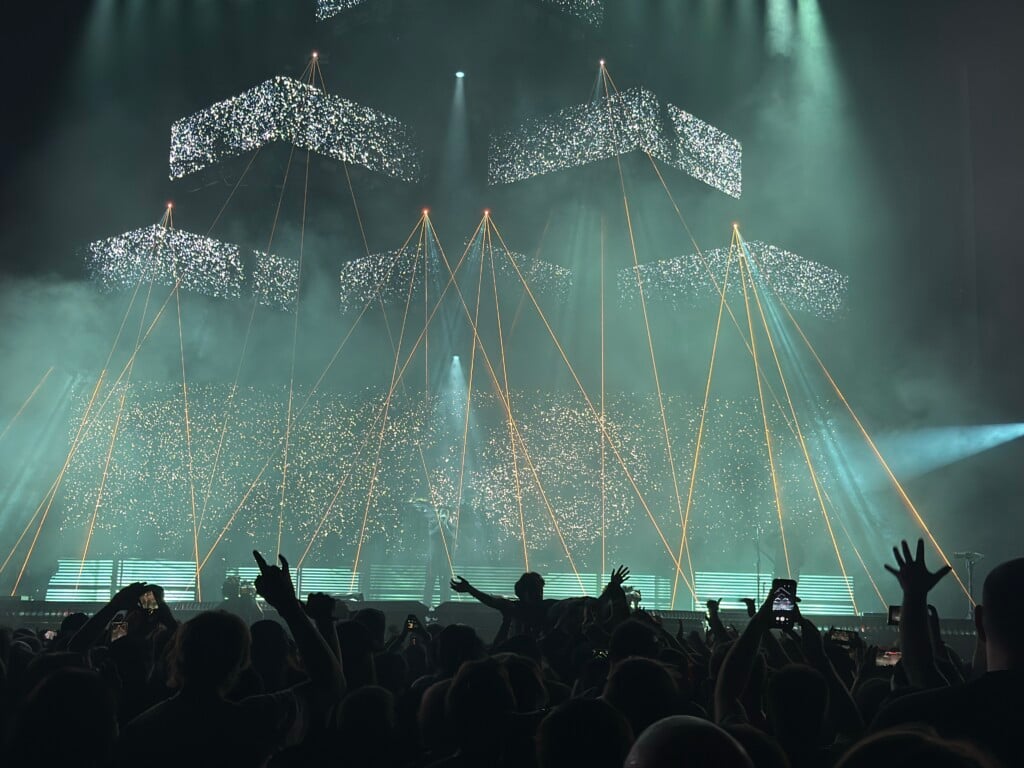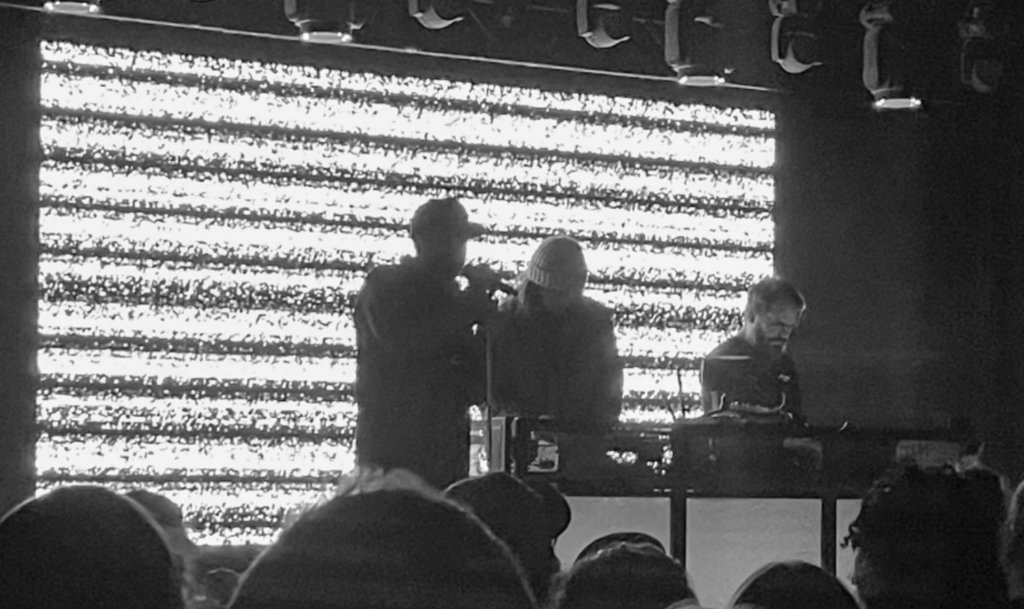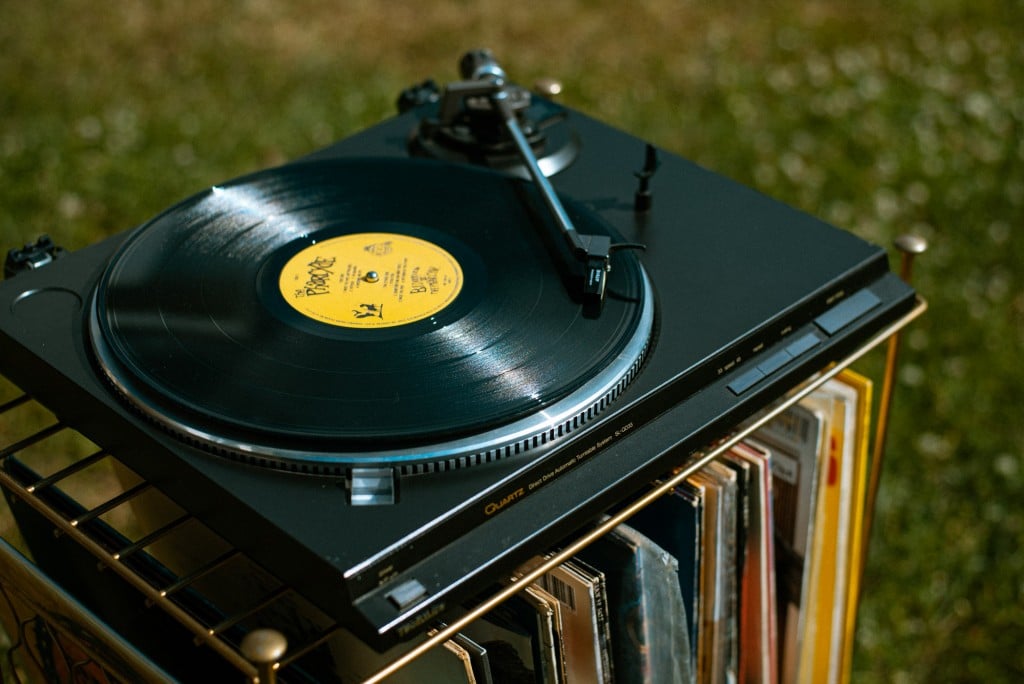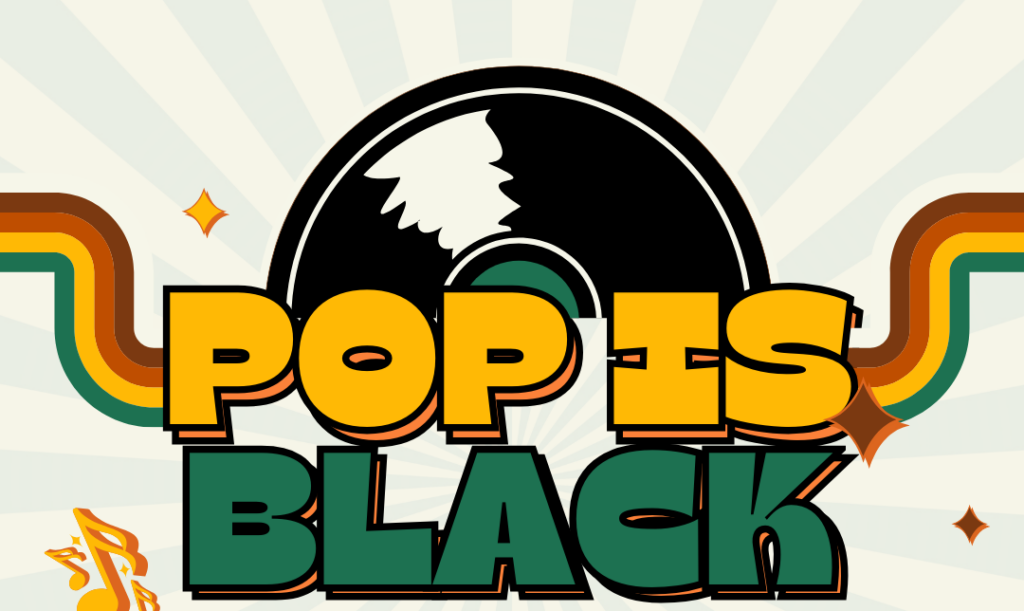‘A space for us to be happy.’ An evening of LGBTQ+ pride with MUNA at The Truman
MUNA arrived at The Truman on Thursday to an air of well-deserved hype, returning to Kansas City for the first time since the September 7 release of their self-titled third album—a no-skips, genre-bending high watermark for the band that has cemented their status as makers of very good and unapologetically queer pop music. The LA trio have a knack for writing open-hearted, shout-along anthems that celebrate people being their authentic selves.
The subtext of the evening was clear, not spelled out but understood by all: This was a night for the gays.
Michael A.C. was standing by me as fans filed in before the 8 p.m. show, wearing a light pink T-shirt with white text reading, “MUNA made me gay.” He had bought it from the merch booth as soon as he walked into the downtown venue, after completing the three hour drive from Omaha, where he goes to the University of Nebraska-Omaha and hosts a program on the student station, Mav Radio. The gray T-shirt he wore earlier, bearing the name of his college, was rolled up like a towel in his hands. He didn’t mind holding it.
The bisexual man, sporting a dark swoop of hair in a faux-hawk and a jean jacket decorated in buttons, has been a big supporter of the album at the radio station since he first heard it in September. He immediately downloaded MUNA in its entirety to play it on the air, believing the record a contender for album of the year, built of nothing but bonafide singles. The music across 11 tracks ranges from the sort of propulsive, modern-sounding dream-pop that has rocketed them to indie success, to achingly beautiful country ballads showcasing a newer, softer, stripped-down side. Lyrics continue to lift a community that has fought to see their relationships reflected in pop music.
“I do not remember another pop band at that level with so blatantly queer and celebratory queer, off the top of my head—closest thing may be the B-52s, but they were more about the party,” Michael shouted over the bass-heavy background music and idle chatter. “It’s an album that gives people permission to be who they are.”
He had gone to class that morning and decided in the spur of the moment to attend, hitting the road before he had bought a ticket online. Now he was here.
By the time the lights dimmed, I was trying to snap pictures at the front of a crowd that had doubled in size, those behind me, including Michael and my sister and a friend of a friend I hadn’t seen in years and hundreds more who knew this was not to be missed.
A slow-building cacophony of digital blips, atmospheric voices and synths reverberated from the speakers as figures emerged from the smoke-filled darkness. The beat kicked in, lead singer Katie Gavin, guitarist Josetta Maskin, and multi-instrumentalist Naomi McPherson charged through MUNA‘s club-ready single “What I Want.” The catchy, throbbing sound of the club-ready track serves lyrics that are uncomplicated and liberating.
When Gavin got to her “I want” chorus — a thematic hallmark of many a great musical number — a sea of people sang along with the precision of fans who have listened to it in their cars on the way to work, in earbuds at the gym. The pivotal line rang out like a joyful cry.
“I WANT TO DANCE IN THE MIDDLE OF A GAY BAR!” the crowd roared. “THAT’S WHAT I WANT; THERE’S NOTHING WRONG, WITH WHAT I WANT!”
Moving seamlessly from “What I Want” into 2019’s “Number One Fan,” one of their most well-known hits, was an acknowledgment the band has a deep catalogue of beloved tracks three records into their career. As Katie uttered “So I heard the bad news,” in a deep, monotone timbre, those around me began chanting along and leaping in place. The band was all happy looks and frequent dance breaks.
Part of the story of MUNA is the story of so many bands–from Fleetwood Mac to the Talking Heads to, apparently, Paramore–the members are so close, and can write so well together, that, of course, there’s been inner-band romance. Katie and Naomi, who met at the University of Southern California, dated before they began performing music with Josetta, another classmate and friend. Relationships have been the downfall of great bands, or at least there’s a mythos they have. On stage, however, MUNA radiates only pure, supportive best-friend energy.
Their show was one of the finest I have seen in Kansas City since the return of live music because it felt like the bandmates’ personalities were able to shine through, in the unscripted and spontaneous way it does only around friends. They also playfully leaned into their gender-neutral, sex-positive image, branding songs horny or “thirsty for mental wellness,” or claiming, with mock seriousness, “We’re doing revolutionary gender stuff here.”
The truth is that in the historically heteronormative landscape of pop music, MUNA is.
The women of MUNA carved out their own spaces on the stage but were more than happy to share the spotlight.
Katie—wearing a black skirt and shirt, black thigh-high leather boots, black arm sleeves — never stayed in one spot for long as she broke out into infectious bouts of dancing, flicking her knees to the beat, shuffling sideways across the stage, dropping to the floor with the mic stand in one hand and popping up. Josetta prowled the stage with a rockstar swagger before planting her feet in one spot, swaying like a butch Bruce Springsteen in a rolled-at-the-sleeves flannel shirt, jeans, and black Converse sneakers. Naomie, calm and cool underneath a mop of curly locks, stood behind a boxy keyboard configuration but often grabbed a guitar and joined the other two. They came to a pause a few times to banter, to take in the moment.
Early on, the three were reminiscing about a time they performed in Kansas City a long time ago, during a tour where they liked to hang out after the shows and make late-night drives to the next stop. Josetta recalled they were preparing to hit the road when someone handed them a bag of Flamin’ Hot Cheetos and a jar of Jiffy and Dove dark chocolate to give them a boost. They ate them the whole way, Josetta said; the protein kept them awake.
“So, Kansas City has done us great things in the past,” she said into her mic.
“Thanks for the snacks; we appreciate it,” Naomie added as she held up her drink to the room.
They went on to play “Loose Garment,” the second-to-last track on MUNA, a song with a magical, majestic build, full of woodwinds and horns and strings. It’s a slow, melancholy-sounding song about sadness, but the instrumentation also invoked a John Williams-esque sense of wonder, and perfectly captured the feeling of seeing MUNA live.
Their mix of songs on Thursday felt like a perfect balance of the party and the comedown; they would play several up-tempo bops in a row, going from the guitar-shredding ecstasy of “Solid,” into the slow-building “Stayaway—with a robot-voice breakdown that turned into a jam session — into “Runner’s High,” a song built of walloping production and house grooves. To hear these songs, so polished on the records, with live drums, bass and guitars was like hearing them for the first time, a different experience. Then Katie, Josetta and Naomi would take things in a quieter direction.
“Kind of Girl,” a gorgeous, brutally honest folk ballad about making mistakes and getting better, was the tenth song they played and one of the best. Katie’s lilting, country-twinged voice soared over gentle acoustic instrumentation that grew into a rousing chorus, the full band behind her.
Before the performance of “I Know a Place,” the moving tribute they wrote to the victims of the June 2016 mass shooting at Orlando’s Pulse Nightclub, Katie alluded to how much has changed in the world since the song came out, how things are worse. The lyrics, about finding a place where everyone will lay down their weapons, are hopeful, poetic, and perhaps not in line with the frustrating reality of gun violence facing this country.
But then she began talking about what’s been going on in Iran, where teenage girls have been risking their lives protesting a regime that doesn’t see them as equal.
“It is a fucking revolution,” Katie declared to roaring applause. “I’m just feeling really grateful for the power of young people, imagining something different and what can be possible when we get together and believe in each other’s dreams. So thank you guys for making something real out of something we just imagined.”
No matter what Jack Black says in School of Rock, it’s hard to say how much a good rock show can change the world; but they can remind us of what’s good in the world, and leave us feeling a little changed, or uplifted. This one did that for me and people around me, who expressed they felt uncontainable joy in a time where basic gay rights like marriage suddenly feel at threat. Fans of every age, from those with graying hair to those with braces, were reminded love is love, ignore anyone who says otherwise.
In the bustling moments before the show, as attendees were getting drinks and securing their spots, I found myself directly behind a group of women who had firmly planted their flag in the front row. Ashton Bennett, of Kansas City, was making an iPhone video that caught my attention, slowly panning over her friends until she arrived at one who was holding up her phone with the message “Anyone Gay,” a blank look on her face. Bennett started cackling.
I asked her about it, awkwardly over the mounting noise, hoping MUNA wouldn’t cut me off by coming on stage.
“I didn’t know she was gonna put the ‘anyone gay’ on her phone,” Bennett shouted, laughing. “It’s funny because everyone is gay here probably.”
As MUNA went through their stellar set, the friends earned plenty of attention from the band, perhaps more than anyone else in the crowd. They embodied the sort of number-one fan the band has sung about, mouthing along to every word, reaching their hands out in an effort to make contact with their idols. Katie, Josett and Naomi reciprocated by frequently calling the friends out and making prolonged eye contact with them, as if to say, “I see you.”
They were right up front until the final song of the evening, “Silk Chiffon,” the first single from the new album that has become one of my most listened-to songs of the year, an instant classic, country-pop bop about queer love. The show brought the only true surprise of the night, as they announced a special guest from Kansas City would perform with them. Caleb Hearon stepped out onto the stage in an Aaliyah T-shirt and a trucker hat.
The openly gay comic, who appeared in the song’s music video along with featured artist Phoebe Bridgers, blew the roof off of the venue, singing with passion and obvious love and respect for MUNA. It felt, almost, like he was the stand-in for the audience — gobsmacked and overjoyed to be in the presence of such awesome artists.
I saw Bennett again, walking by me in the front area of The Truman.
“I was just telling my friends: I’ve never understood the whole, like, religious experience at a concert, until today,” Bennett said. “Truly, like, I’ve never cried at a concert.”
I asked her what it was like when the band turned their focus to them. “It was kind of scary, I’m not gonna lie,” she said.
Michael was hanging out in the lobby, too, struggling to put into words how special what he had just seen was.
When they did “Kind of Girl,” he said, he looked around the room and saw the awestruck faces of people singing. It was an emotional release.
“This was like a space for us to be happy,” he said. “We don’t have a lot of that.”
Ariana Anaya, a bartender at The Truman, has seen a lot of bands in the year she’s been working at the venue; we reminisced about Animal Collective’s psychedelic concert back in July. But there was something different about the concert from the queer LA collective, she said. There was something different about the fans.
At many of the shows she sees, there will be a certain percentage of people who aren’t overly familiar with the band but are curious to see them live, Ariana said. However, this show was populated almost exclusively by people for whom the music means a great deal.
More than any concert she’s worked, there was an LGBTQ+ presence and LGBTQ+ pride, and an overwhelming feeling of acceptance.
“It was extremely joyful,” Anaya said. “That’s the best word for it.







